Our Insights
Blog Posts
.avif)
2025: A Year in Review
2025 is behind us, and 2026 is underway. Before we fully turn to what comes next, we want to pause and reflect on what made the past year so meaningful.

Strategy is Lost in Translation
When driving adoption of OKRs as a strategy execution framework, avoid losing sight of your business strategy by making a few simple changes in how you communicate.
.avif)
CEO View — Operating Rhythm and Rigor
The only reason to implement OKRs is to improve strategy execution and drive peak organizational performance — to increase the predictability and probability that you achieve your long-range strategic ambition by concentrating attention on the most important outcomes. Here are 2 sources of confusion that get in the way of peak performance.

6 Powerful Insights from the Gartner CHRO Executive Summit
In a session on "Aligning Workforce Strategy with Business Goals," WorkBoard CEO Deidre Paknad, Birkenstock CHRO Michael Hoessl, and Rodan + Fields CHRO Jessica Raefield surfaced six powerful insights on what it takes to lead HR into the next era.
.avif)
4 Tips for HR on Improving Org Dynamics & Engagement with AI
AI should be at the top of HR priorities this year. At HR West's 2024 conference, WorkBoard CEO Deidre Paknad shared 4 tips to help HR practitioners ramp up their impact.
.avif)
Internal Barriers to Your GenAI Vision
Business leaders are excited about GenAI's potential as a game changer in their commercial offerings and internal operations, but there is remarkably low interest or uptake in their organizations. Use these 6 tactics to reduce fear, increase familiarity and drive usage frequency across the organization.

OKRs for the Revenue Organization
For a long time, people kept OKRs separate from KPIs. The thinking was: don’t let OKRs just become revenue metrics. Don’t tie them to comp plans. Keep them aspirational. But in 2025, that separation adds confusion. OKRs and operating metrics should be visible together and serve different purposes. They need to work together.
%20(1).avif)
AI in Banking – How and When to Implement it
Explore how AI in banking improves customer experience, operational work and organizational execution to accelerate performance and resilience.

Digital Banking Trends: Evolution from 2020 to 2026
See how digital banking evolved from 2020 to 2025—and what trends are shaping the future of finance.
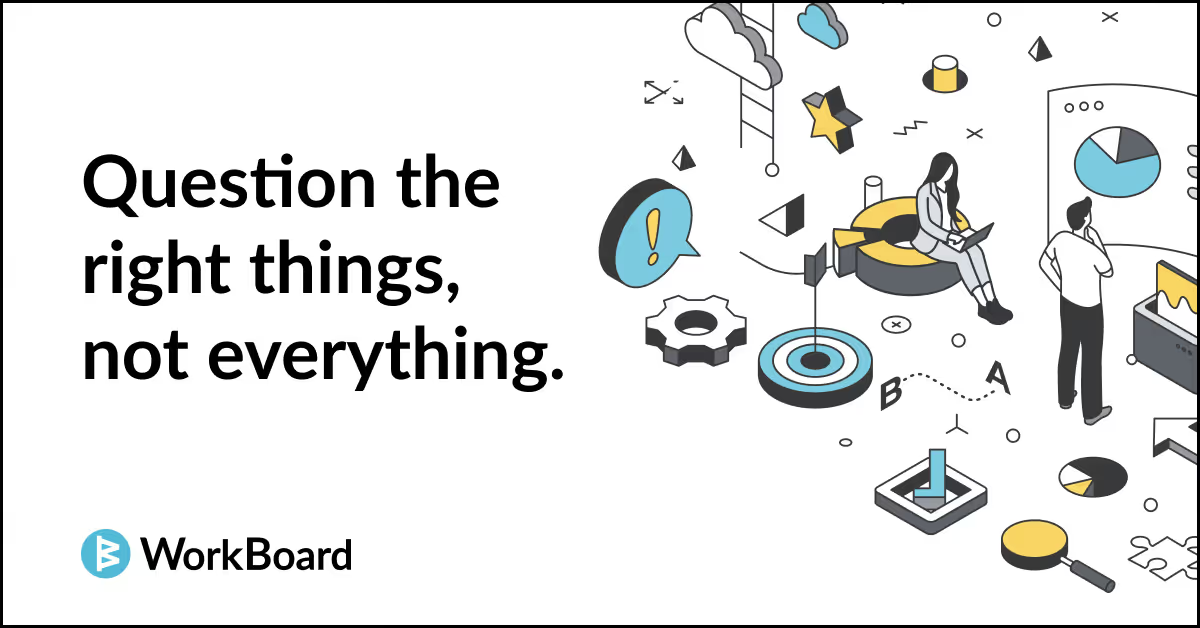
Question the right things, not everything
Your role as a leader is not to manage everything and be on top of every detail. Rather, it is to build your team, translate the strategy, and then drive its execution by supporting the team, asking the right questions, and holding people accountable.
.png)
What are Vertical AI Agents, and How Can They Improve Strategy Execution in Your Company
Vertical AI agents are quickly becoming an essential part of how organizations operate. What seemed experimental a few years ago is now a practical way for leaders to extend their teams with AI that takes on real operational lift and reinforces the work that matters most every week.

The Top 5 Viva Goals Alternatives
Microsoft Viva Goals is retiring at the end of 2025. In this article, we’ll cover migration options, core platform capabilities, added benefits beyond OKR management, potential downsides, and pricing.

WorkBoardAI — The #1 Viva Goals Alternative
Microsoft Viva Goals will retire on December 31st, 2025. With this article, we’ll show you how easy it is to transition from Microsoft Viva Goals to WorkBoardAI (like 30+ Viva Goals customers already have).
.avif)
Managing AI agents. Accountability
AI agents are just starting to give you extra resources that, if deployed and managed correctly, can help you achieve bigger goals. One thing is for sure, being a manager is about to become even more complex, and even more important — with accountability being the true measure of your success.
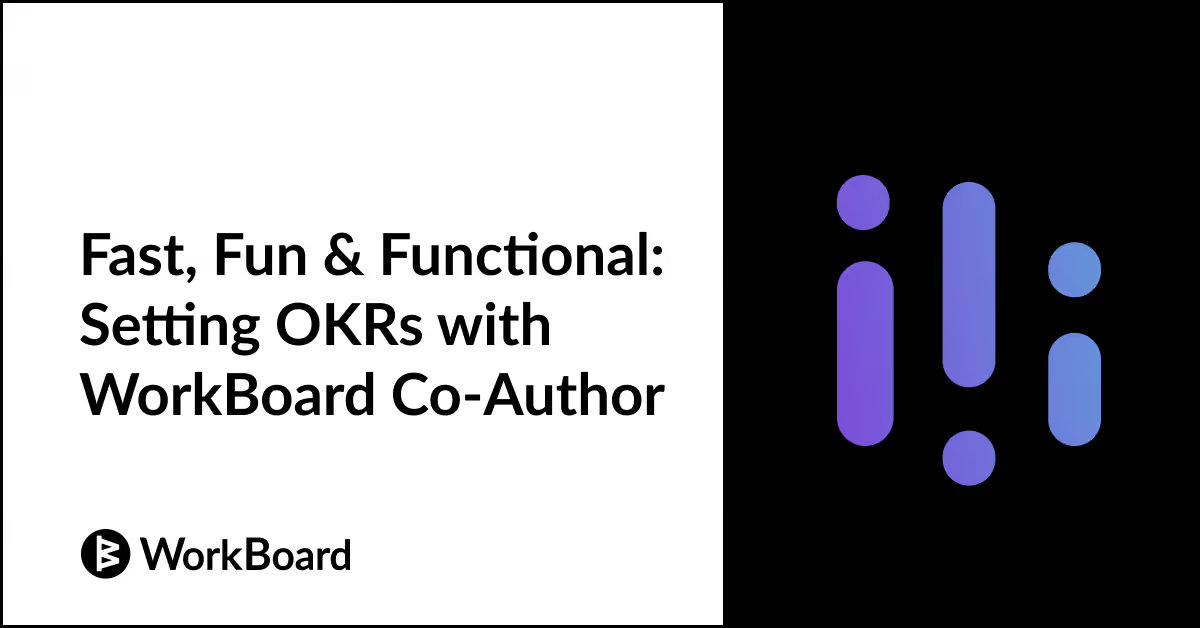
Fast, Fun & Functional: Setting OKRs with WorkBoard Co-Author
Getting everyone aligned on results going into next quarter is much faster and more fun with genAI in WorkBoard Co-Author. Learn how Co-Author can help teams quickly get to agreement on their best outcomes.
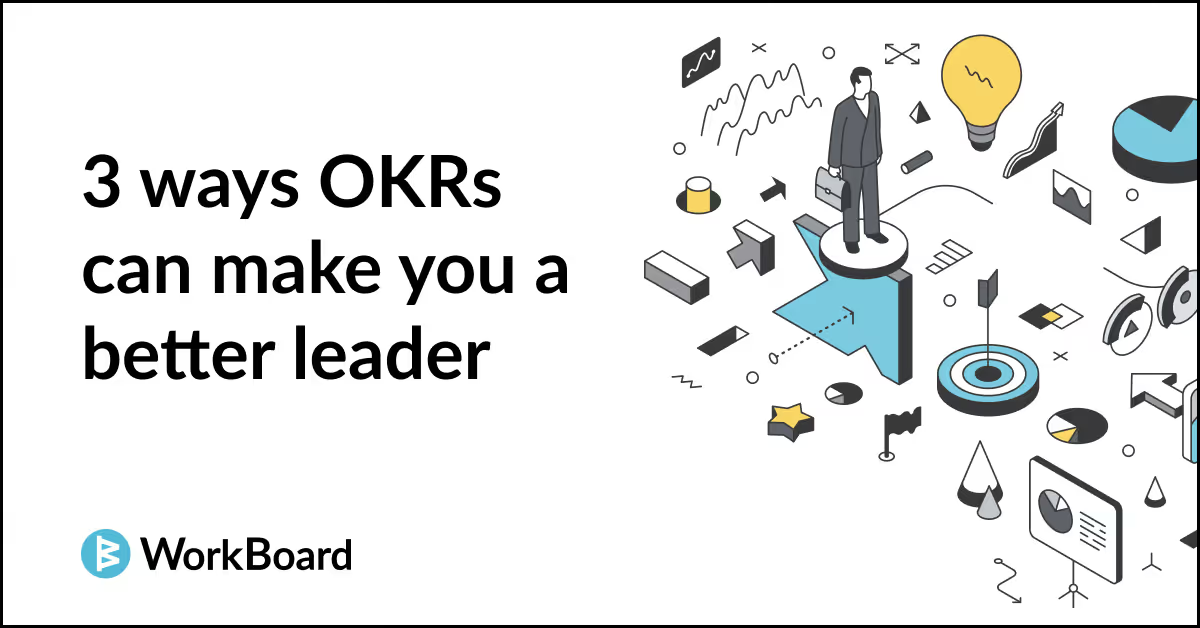
Three Ways OKRs Can Make You a Better Leader
The fastest way to improve as a leader is to get the foundations right. If you’re spinning trying to eke out 1% improvements, you’re probably missing the opportunity to transform your leadership and team’s performance. Here are 3 20-50% improvements you can make today.
.avif)
Surfacing Impactful Results Insights with GenAI and Semantic Search
In this technical blog, Bhavin Vyas, VP of Data Science & Engineering at WorkBoard, discusses how the company is leveraging GenAI, semantic search and vector databases to deliver impactful strategy execution insights to customers.
%20(1)%20(1).avif)
Strategy Execution: What Got You Here Won't Get You There
The management techniques that you've used in the past got you where you are now. This next decade will require a new management model designed for a world of continuous and substantial change.
.avif)
The Generational Shift of AI in the Workplace
As a seasoned tech founder, WorkBoard CTO and Co-Founder Daryoush Paknad has participated in several major technology shifts, from mainframes to client server, from data centers to cloud computing and more. Now he reflects on how artificial intelligence is transforming the workplace.
%20(1).png)
The Complete Guide to Writing OKRs (with Co-Author)
Getting everyone aligned on results going into next quarter is much faster and more fun with genAI in WorkBoard Co-Author. Learn how Co-Author can help teams quickly get to agreement on their best outcomes.

6 CxO Habits That Create Strategy Execution Advantage
Leaders that consistently achieve their strategies are intentional about strategy execution and invested in ensuring their method, data set, and discipline is on par with the strategy itself. Learn the 6 strategy execution habits that set them apart from their peers.
%20(1).avif)
Driving High-Velocity Cross-Functional Collaboration
Learn how OKRs, collaboration boards, and AI-powered execution strengthen cross-functional alignment, improve visibility, and accelerate business results.
.avif)
A Systematic Way to Get Strategy Execution Right
Understand how to get strategy execution rightand how WorkBoardAI help syou strengthen alignment, accountability, and real-time visibility across the organization.
.avif)
Building a Modern Operating Rhythm
As the pandemic has fueled the growth of remote work and the pace of strategic planning, more companies are looking for greater transparency around goals and execution. In this discussion with McKinsey executive editor Daniel Eisenberg, Deidre Paknad, the co-founder and CEO of Workboard, shares how the company is growing a business that provides just that.
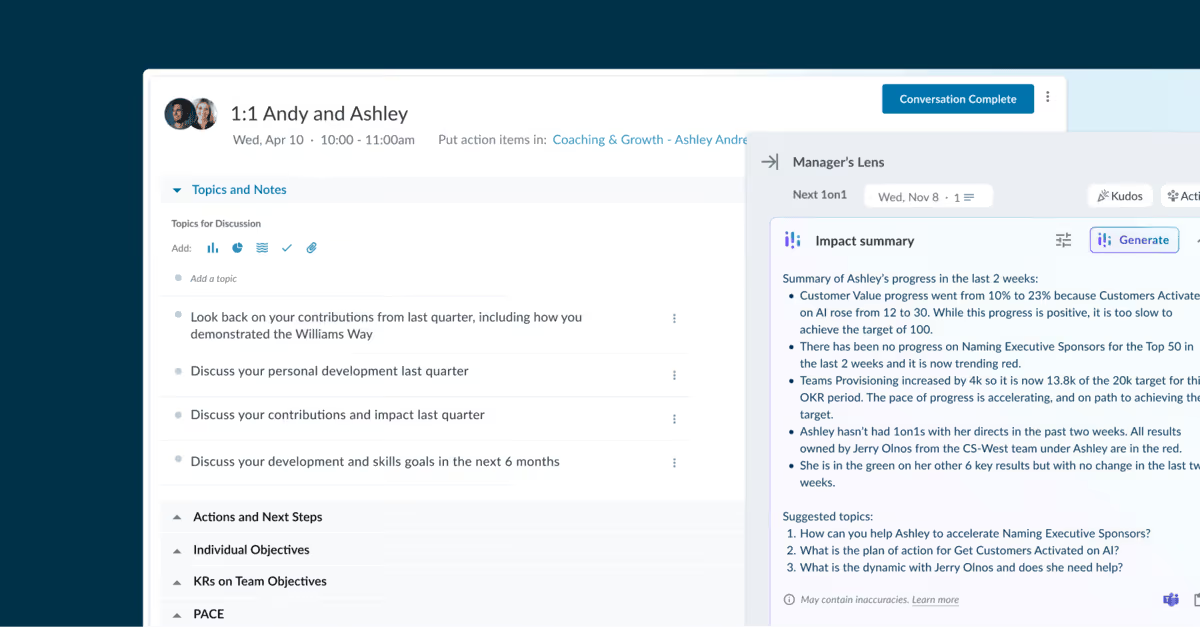
Run Smarter, More Efficient Reviews with WorkBoard Scorecards
Display your team’s OKR progress on a single page, drive focused discussion on progress to plan & path forward, and shift focus to where it’s needed most. Drastically reduce the time and costs spent in business review preparation, and ensure data integrity by connecting directly to the source: your OKRs right in WorkBoard.
.avif)
Being Intentional About Results
Don't let the OKR process obscure its purpose, or lose sight of the fact that OKRs help teams agree on what matters and focus efforts there.
.avif)
3 Steps to Better Meetings
Get three practical tips that you and your team can use to run more effective and efficient meetings and better align your time to your intent.
.avif)
3 Characteristics of the Best Chiefs of Staff
A leader's Chief of Staff can be a game-changer, and a key member of a leadership team, serving as a strategic advisor while managing day-to-day operations. Superstar Chiefs of Staff possess three common characteristics.

OKRs are a Competitive Advantage
Jeff Gothelf, co-author of Lean UX and OKR expert, explains how teams that set their goals as OKRs have a unique competitive advantage in their market.
.avif)
OKR Examples by Function and Team
Need OKR examples? You landed on the right spot! The examples in this article illustrate how functions can set meaningful objectives that reinforce strategic priorities.

OKR Retros for Smart Teams
OKR Coach Sameera Moinpour shares insights from recent team retros that can help your team achieve its best possible results this quarter.
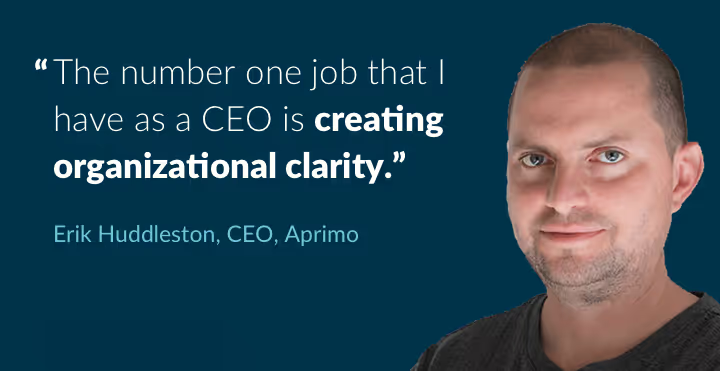
The OKR Renaissance is Real
According to Gartner, the success of enterprises that operationalize organizational clarity with OKRs is what is fueling the renaissance in the practice.
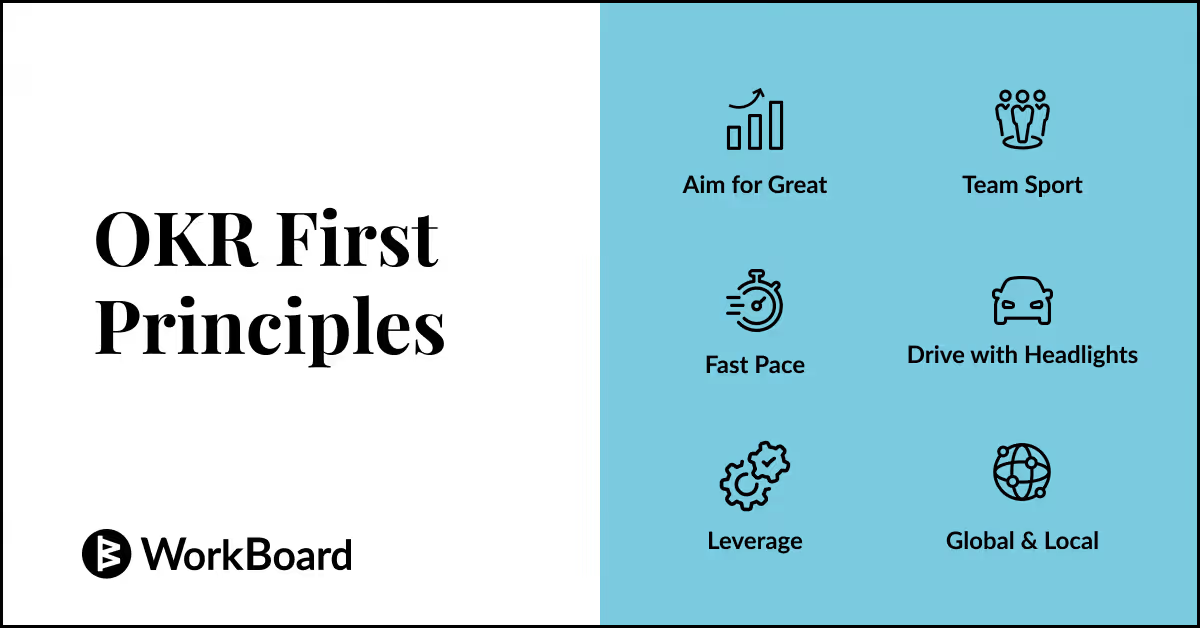
OKR First Principles
Using OKRs to align and achieve your best outcomes is quickly becoming a strategy execution norm... but this is not MBOs and KPIs with another name. WorkBoard CEO Deidre Paknad shares her first principles for OKR success.
%20(1)%20(1).avif)
How to Create Team Synergy and Keep It Going
For any leader wanting a results-oriented team, that team must operate in synergy. Learn the three 'foundations' that must be in place for synergy to occur.
.avif)
What Goes Wrong with OKRs?
Like all new things, adoption of the OKR process takes time, effort and commitment and you can improve every quarter. Learn about the 5 most common pitfalls that can occur - and how to avoid them.
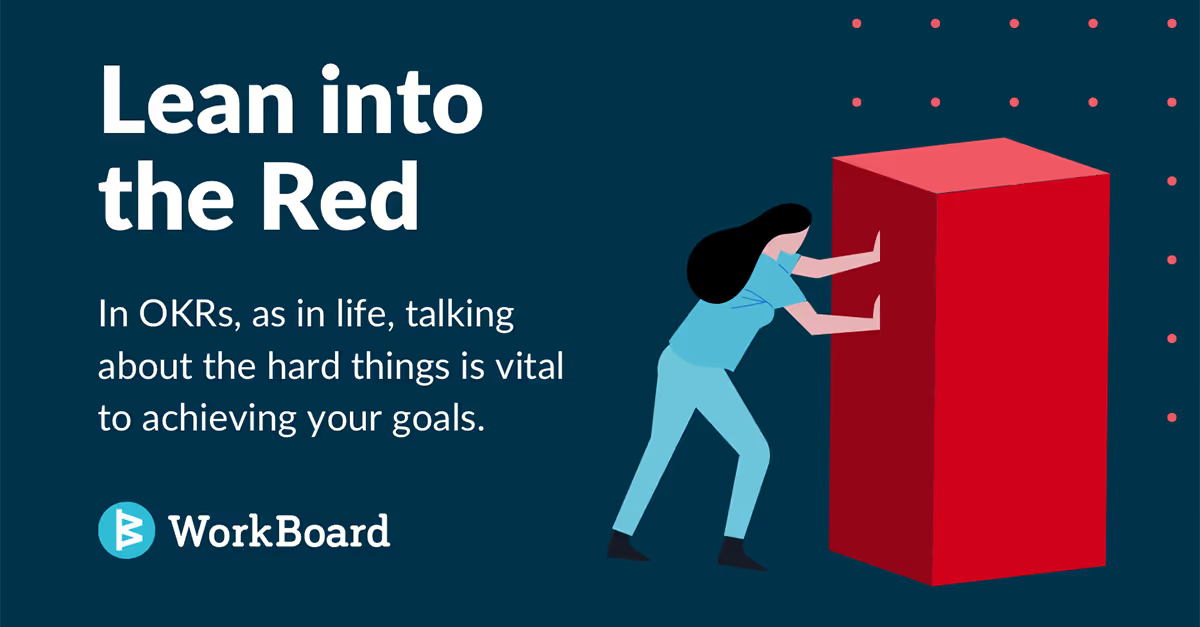
Lean Into The Red
In OKRs, as in life, talking about the hard things is vital to achieving your goals. While it’s important to celebrate what we’re doing well, targeting the areas that are blocked or need attention is where real growth happens.
.avif)
Watermelon Metrics
Watermelon metrics look green on the outside when they’re red on the inside. Get five culture and behavior tips to help you measure what matters more effectively, and foster a growth and Outcome Mindset™ where people embrace facts and data to fuel their decisions.

How Will AI Help Good Managers Be Great?
Artificial intelligence in business is a breakthrough that can enable good managers to be great. The key is to embrace the opportunity artificial intelligence in business presents for individual and organization success, including scaling your skills and using AI to scale your impact.

Be Fearless About Feedback
While feedback on what we do well is gratifying, feedback on what we can do better helps us improve. By viewing feedback as learning and leading opportunities, we maximize career and team velocity.
.avif)
The Fundamentals of OKRs
Learn what OKRs are, how they work, and why they're important for aligning on and executing the strategy within your organization.
.avif)
Why Use OKRs?
Bold OKRs are adopted by companies for one of three key reasons: Focus, Alignment, or Acceleration. Learn how to use stretch goals to encourage employees to continually push the envelope towards great achievement.
.avif)
The Formula for Great 1on1 Meetings
If you lead a team, coaching people and giving regular feedback — positive and constructive — is part of the job. Prioritizing 1on1s and doing the “soft stuff” that builds morale, culture and people are strategic elements of leadership. Elevate your 1on1s by covering these five topics for more impact.
.avif)
Coaching 'In The Moment'
Executive coach and guest velocity guru Beth Armknecht Miller offers tips on identifying the best times to provide coaching and feedback to your employees.
.avif)
Your Secret Weapon: The Monthly Coaching Conversation
Regular 1on1 meetings increase engagement and have a positive effect on productivity. Improve your outcomes with open and consistent communication between leadership and the workforce.

Start Coaching with Trust
Coaching has become a critical competency for today’s leaders, and has been shown to deliver a number of benefits including: increased performance, communication skills, and better work relationships. Here are six techniques to use during your coaching conversations to make them productive.

The 7 Common Challenges of Coaching
Coaching can be an extremely rewarding experience, but there are times when the coaching relationship can become frustrating to you and/or the coachee. So what could be causing your frustration?
.avif)
Change Management Guide For Every Enterprise
This guide focuses on foundational change management principles to give you a practical way to drive adoption, reduce resistance, and build organizational muscle for continuous change. Change agents and their ideas are the life force of organizations, but not all employees thrive on change. How you communicate new ideas plays a huge role in how well they're received and how quickly they're adopted. Use these 5 questions to prepare and communicate your vision for innovation.
.avif)
4 Steps to Less Stress at Work
Work stresses people out — fear of failing, pressure to achieve, having to rely on others for our own success, overload, self-doubt and more... In fact, one million Americans call in sick over stress every day and 25% say work is the most stressful thing in their lives.
.avif)
5 Steps to Stellar Year-End Performance Reviews
It’s mid-year review time and if you're like many people, you haven’t thought about goals in 5.5 months. Not a great moment for manager or team member, but it’s a common one. These five steps will help you be more successful and get more recognition at your year-end review.
.avif)
8 Tactics for Successful Goal Setting
Goal setting is both art and science; goal achievement results from inspiring and aligning the efforts of others and diligent management. These 8 tactics can improve how you set and how often you achieve your OKRs:.
.avif)
The 4 Non-Negotiable Qualities of Leadership
Leadership is a personal quality and behavior, not a role or title. And while it’s always been important for senior managers and executives to lead, it’s never been more important for front line managers to do so.
.avif)
The Dreaded Weekly Status Report
This is a guest blog post from execution and velocity guru Christina Wodtke, who is currently writing a new book about using OKRS (objectives and Key results), predictive roadmaps, and a cadence of celebrations to build high performance teams.

4 Ways to Increase Your Execution (and Career) Velocity
Improve execution velocity by reducing noise, aligning effort to outcomes, and sustaining a fast, disciplined operating rhythm. Learn how.

5 Ways to Manage Job Stress
Work can push all our stress buttons. While too much stress isn’t good, the sensation of stress is an important business signal — it can help us identify what needs our attention.
.avif)
The Five Things Great Bosses Do
Studies show that when you’re great at your job, the results are high employee engagement, higher profits, and better customer service. This infographic celebrates great bosses and the five things they do that make their teams and their organizations very successful.

How to Achieve Quarterly Goals
The start of each quarter is goal setting time, and many of us also self-assess accomplishments against the previous quarter's goals. Nail your next quarter with these 3 tactics for goal achievement.

A Better Way to Manage Email
We tend to work on the last 20 items in our email inbox whether or not they’re worth working on. Without a persistent list of strategic priority work and clear goals, it’s impossible to execute well.
.avif)
Find Your Calling, Do What you Love
Author and blogger Michael Hyatt recently laid out three essential ingredients that turn a person’s vocation into their calling: you must love what you do, you must be talented at what you do, and you must be able to make a living doing it.
%20(1).avif)
Strategic Goal Alignment: Job One for Managers
When individuals lose focus on the organization's goals, both team and personal aspirations can suffer. These 8 tactics can help prevent career and goal gaps between managers and team members.
.avif)
How to React to Failure and Embrace Mistakes
Without clear thinking, fear of failure and failure itself can undermine our leadership styles, performance, judgment and even our happiness. Here are three tips for embracing fear and failure and getting value from them.
.avif)
3 Steps to Growing Your Personal Branding and Build Happiness
Everyone understands why a business needs a solid brand — it distinguishes the company and conveys its essence. Likewise, the people who take the time to build their personal brand stand out in a crowd of talent.

The 5 Dynamics of Low Performing Teams
Low performing teams are plagued by dysfunction and produce more frustration than progress. What undermines the performance of groups and teams?

Leadership Communication Tips and Techniques
Learn how to reinforce a team engagement model in which ideas are readily shared, facts are transparent and business decisions are enriched with them.
.avif)
6 Characteristics of High-Performing Teams
High performing teams seem to generate their own energy and elevate everyone on the team to their full potential. What sets these teams apart from the rest?
.avif)
The Art of the OKR
The OKR approach to setting goals is key at high growth Silicon Valley companies. Coach, consultant and guest velocity guru Christina Wodtke offers a template for masterful goal achievement.